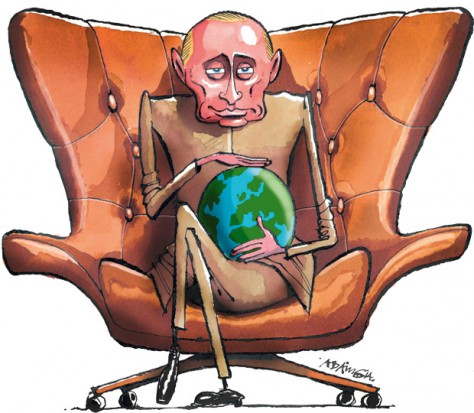Russia, Ukraine, the European Union and the United States will meet in Geneva later today in order to find a solution to the confrontation in eastern Ukraine. There is not much hope of success. The Obama administration has been lowering expectations, so too the Foreign Office.
Kiev’s heavy-handedness in eastern Ukraine has embarrassed the western allies; not least because the military deployment yesterday exposed Ukraine’s inherent weakness: government forces were either incapable or reluctant to enforce Kiev’s writ in the east of the country. There were further violent clashes overnight. Kiev says that 3 ‘Russian separatists’ were killed and 13 wounded when trying to seize a military installation on the Sea of Azov. Anti-Russian demonstrations are expected in Donetsk province today, which is likely to antagonise ethnic Russians, whose rights Vladimir Putin has vowed to protect.
Russia continues to mix bellicosity with our own liberal pieties. Putin has stationed perhaps as many as 40,000 troops on the Ukrainian frontier, while proclaiming the rights of ethnic Russians to self-determine. Russia wants constitutional reform and devolution that would allow regional Ukrainian governors to move closer to Moscow, which is unacceptable to those who would maintain Ukraine’s administrative integrity as well as its territory.
The United States and the European Union want to de-escalate the crisis. They demand that both sides in Ukraine stand down, and that Russian forces withdraw from the frontier. A negotiated settlement can then begin. As to what this settlement would look like, particularly in its finer details, is not yet clear. The western powers cannot negotiate the sovereignty of Ukraine over the heads of Kiev, and Russia has given itself no space to negotiate. It’s very difficult to see how there can be a diplomatic resolution at this stage. Sticks, therefore, are being prepared.
The United States is threatening more sanctions and there is talk of giving ‘non-lethal’ aid to the Ukrainian military – medical supplies, boots, uniforms and so on (which says everything you need to know about Kiev’s muscle). The French foreign ministry, meanwhile, has said that if talks fail then the European Union will impose sanctions on Russia. Whether or not such sanctions would be effective is debatable; European countries depend, to varying degrees, on Russian natural resources, and Putin has exploited that power before.
There are, very obviously, limits to what the European Union can do without a coherent foreign policy, let alone armed forces. The United States, too, seems exhausted after 13 years of war. Notwithstanding these facts and impressions, NATO is still a mighty stick. Vladimir Putin appears to understand, and perhaps even respect, force rather better than diplomatic courtesy and the conventions of international law. He is, after all, a KGB man, not a graduate of UNICEF. NATO has announced that it is increasing its presence in Eastern Europe and the Baltic states – a clear message to Putin that his dreams of restoring the ‘Russian empire’ must end at those borders. Perhaps the Secretary General of NATO should be at the negotiation table?






Comments